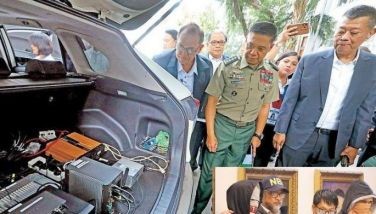Marcos: Read Martial Law newspapers to learn more about my father's rule
MANILA, Philippines — Those who wish to learn more about his father’s Martial Law rule should turn to "newspapers then and what was reported [about that time]," Ferdinand "Bongbong" Marcos Jr. said amid what he said was the proliferation of false information about his father’s dictatorship.
This is despite his father’s well-documented clampdown on the free press during his martial law rule in 1972.
In an interview with One PH’s "Kandidatalks" that aired Monday, Marcos described himself as a "victim" of fake news, claiming without basis that fact-checkers — who base their reports on facts and sources that can be verified by readers — have their own agenda.
"We are the victims there. There are many being fact-checked about me that I did not say…. So let us make fact-checkers without agenda—no political agenda, no financial agenda," he said.
According to a study by academe-based fact-checking coalition Tsek.ph, the survey frontrunner has been the top beneficiary of "fake news" — meaning false posts about him tend to cast him in a positive light.
The same report stated that Marcos’ rival, Vice President Leni Robredo, meanwhile is at the bitter end of misinformation spread against her.
In the lead up to the 2022 national elections, media organizations, the academe and non-governmental organizations vowed to intensify fact-checking efforts to better inform the public before voting.
Marcos also shared that he is often asked about his father and he always tell people about what he knows, but he has always encouraged them to read up because he will always defend the clan patriarch. “He’s my father. Of course, I'll side with him,” he said in Filipino.
"Study. Research thoroughly. There are so many books there. Go back to newspapers then, go back to what was written there and look at what really happened so you can [know] better," he continued in Filipino.
Clampdown on media
But what happened to the Philippine free press under the elder Marcos?
On Sept. 28, 1972 — the first week of Martial Law — the elder Marcos issued a Letter of Instruction on the 'prevention of the use of privately owned media facilities and communications.'
This authorized the military to take over assets of ABS-CBN, News 5 and other radio stations, as accounted by the Martial Law Museum in its website.
While assets of major outlets accused of being used for "propaganda purposes against the government" were sequestered, other media outlets continued to operate, such as Philippine Daily Express, the Kanlaon Broadcasting System and other television channels.
The distinction among these outlets? The Martial Law Museum said outlets that were allowed to operate belonged to Marcos cronies.
Marcos’ top media man, Primitivo Mijares, also sat as chair of the Media Advisory Council, giving him the power to “dictate and censor content in all forms of media.”
He later confessed in a memo to the "US House International Organizations subcommittee how he had aided Marcos in silencing media stories that exposed government abuses while fabricating others that would trumpet the administration’s supposed successes," the Martial Law Museum said.
Restrictions on media as well as simmering discontent against the Marcos dictatorship and the abuses carried out under it led to the birth of the "mosquito press" — small, indepdendent newspapers that the government allowed to operate to give a semblance of a free press.
Small papers like We Forum, Malaya and WHO magazine wrote about Marcos' fake war medials as well as about government and military abuses at the risk of intimidation, arrest and legal cases.
- Latest
- Trending
































